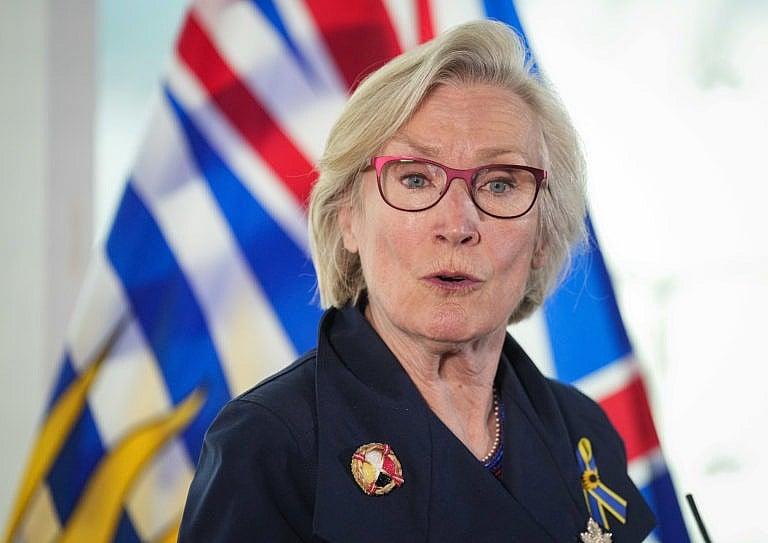Hard drugs to be decriminalized in British Columbia
Politics Insider for June 1: COVID-19 border restrictions to remain in place for another month; mandatory vaccine requirements drop off at Canada’s banks; criticism rains on Francois Legault

Federal Minister of Mental Health and Addictions and Associate Minister of Health Carolyn Bennett speaks during a news conference after British Columbia was granted an exemption to decriminalize possession of some illegal drugs for personal use, in Vancouver, on May 31, 2022. (Darryl Dyck/The Canadian Press)
Share
Welcome to a sneak peek of the Maclean’s Politics Insider newsletter. Sign up to get it delivered straight to your inbox in the morning.
Ottawa and B.C. announced Tuesday that Canadians 18 years of age and older will be able to possess up to 2.5 grams of opioids, cocaine, methamphetamine and MDMA within British Columbia next year, CBC reports. The pilot project will run from the end of January 2023 until 2026, unless revoked, an effort to treat addiction as a health issue rather than a criminal matter.
Federal Minister of Mental Health and Addictions Carolyn Bennett and her provincial counterpart Sheila Malcolmson announced the plan in Vancouver. “For far too long, this wave of loss has been a reality in British Columbia and across the country,” Bennett said. “Today, we take the first steps in the much needed bold action and significant policy change.”
Not far enough: Critics who believe in harm reduction policy said Tuesday that 2.5 grams is too low a limit, the Vancouver Sun reports.
Too far: Jason Kenney told reporters Tuesday that the policy shift facilitates addiction, the Calgary Herald reports.
Seeking shells: Canada is in talks to buy 100,000 artillery shells for Ukraine in a deal that could cost taxpayers several hundred million dollars, the Citizen reports. Officials have been talking to counterparts in South Korea, media outlets there have reported.
Another month: PHAC announced Tuesday that COVID-19 border restrictions will stay for at least another month, CP reports. The agency made the announcement the day after Parliament voted down a Conservative motion to revert to pre-pandemic rules. Conservative transport critic Melissa Lantsman objected: “Unfortunately, the NDP-Liberal government continues to cling to outdated and unnecessary protocols that are exacerbating delays.”
Fixes proposed: Frustrated by delays, Pearson airport chief Deborah Flint wants Ottawa to streamline the movement of people through the terminals by dropping some of COVID-19 checks, expand the powers of the ArriveCan travel app, increase use of biometrics and use new technology to scan luggage, the Globe reports.
Mandates gone: Nine months after imposing mandatory vaccine requirements for staff, four of Canada’s Big Five banks have dropped them, the Globe reports.
Whither the so cons? Will social conservatives vote end up supporting Pierre Poilievre in the CPC leadership race if their champions drop off the ballot before he does, the Post wonders.
Growing slowing: The Bank of Canada is expected to hike rates today, although Statistics Canada data showed the GDP grew at just 3.1 per cent in the first quarter, down from 6.6 per cent in the fourth quarter of 2021, CP reports.
Systemic barriers: A report on the Correctional Service of Canada from the Auditor-General Tuesday finds Indigenous and Black offenders remained in custody longer and at higher levels of security, the Globe reports, a result of systemic barriers that persistently disadvantaged certain groups of offenders.
Third try: In the Star, Susan Delacourt traces the history of Liberal crackdown on handguns, explaining that they only ended up with a freeze after trying two other approaches, neither of which worked.
Goldilocks policy: In the Line, Matt Gurney, a persistent critic of the Liberal approach to gun control, is less charitable, questioning the logic of a handgun policy that allows people to own them, but only if they already have them.
Greene’s view: Also critical of the new gun policy is conspiratorial congresswoman Marjorie Taylor Greene, the Star reports, because she believes it opens Canada up to Russian invasion.
Louisiana? François Legault is being critiqued by allophones who speak French at work but another language at home, for exaggerating the language crisis brought on by immigration, La Presse reports (translation).
At CTV, Tom Mulcair has a blistering column on Legault, who he says is relying on “ethnic nationalism” for his fall re-election plan. He is being met “with a whimper by Justin Trudeau and his hapless Attorney General, David Lametti,” who, Mulcair writes, are “hiding under their desks.”
Under pressure: Both Andrea Horwath and Stephen Del Duca are bullish about their prospects as Ontario prepares to vote tomorrow, but the Star has an item pondering their futures if Doug Ford gets another majority, as seems likely.
Hard to check: Lex Harvey has an interesting piece in the Star on the frustrating process of trying to fact-check Ford, which is hard because he says so little of substance.
Bubble premier: In the Post, John Ivison has a different take on the same phenomenon, describing Ford as “focused and disciplined,” sticking to his message, which should augur well for him.
Majority? CBC’s Mike Crawley has a good election-night primer, pointing out that Ford looks bound for a majority; the New Democrats and Liberals see a path to a different outcome, although they mostly are keen on attacking one another.
— Stephen Maher